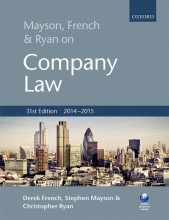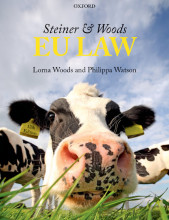Summary: Mayson, French And Ryan On Company Law | 9780198716532 | Derek French, et al
- This + 400k other summaries
- A unique study and practice tool
- Never study anything twice again
- Get the grades you hope for
- 100% sure, 100% understanding
Read the summary and the most important questions on Mayson, French and Ryan on Company Law | 9780198716532 | Derek French; Stephen Mayson; Christopher L. Ryan
-
19 Agency and Authority
This is a preview. There are 3 more flashcards available for chapter 19
Show more cards here -
The Rule of Agency Law
An agent can act only within what is known as the agent's 'authority': the principal of an agent is not bound by any legal relationship which the agent purports to put the principal into if it was outside the agent's authority. -
19.1 Actual Authority
This is a preview. There are 2 more flashcards available for chapter 19.1
Show more cards here -
Freeman and Lockyer v Buckhurst Park Properties (Mangal) Ltd [1964], Diplock LJ
Actual authority is “…a legal relationship between principal and agent created by a consensual agreement to which they alone are parties. Its scope is to be ascertained by applying ordinary principles of constructions of contracts, including nay proper implications from the express words used, the usages of trade, or the course of business between the parties…” -
19.1.2 Implied Actual Authority
This is a preview. There are 3 more flashcards available for chapter 19.1.2
Show more cards here -
Hely-Hutchinson v Brayhead Ltd (1968)
Lord Denning MR: It is implied when it is inferred from the conduct of the parties and the circumstances of the case, such as when the board of directors appoint one of their number to be managing director. They thereby impliedly authorise him to do all such things as fall within the usual. -
19.2 Apparent or Ostensible Authority
This is a preview. There are 3 more flashcards available for chapter 19.2
Show more cards here -
Armagas Ltd v Mundogas SA [1986], Lord Keith of Kinkel
Ostensible authority comes about where the principal, by words or conduct, has represented that the agent has the requisite actual authority, and the party dealing with the agent has entered into a contract with him in reliance on that representation. -
19.2.1 Doctrine of Ostensible Authority
This is a preview. There are 3 more flashcards available for chapter 19.2.1
Show more cards here -
Doctrine of Ostensible Authority
A contractor does not know that the contract is outside the agent's actual authority is under no obligation to enquire whether it might be, unless the transaction is abnormal or there are other circumstances giving rise to suspicion (Hopkins v T L Dallas Group Ltd [2004]). -
19.2.1.1 Representation
This is a preview. There are 2 more flashcards available for chapter 19.2.1.1
Show more cards here -
Freeman and Lockyer v Buckhurst Park Properties (Mangal) Ltd [1964]
Diplock LJ: The commonest form of representation by a principal creating an 'apparent' authority of an agent is by conduct...thus, if in the case of a company the board of directors who have actual authority under the memorandum and articles of association to manage the company's business permit the agent to act in the management, they thereby represent to all persons...that he has authority to enter on behalf of the corporation..." -
First Energy (UK) Ltd v Hungarian International Bank Ltd [1993]
The manager of the bank's Manchester branch had made an offer of financing facilities to First Energy (UK) Ltd. He did not have either actual or ostensible authority to decide to make such an offer himself but it was found that he had ostensible authority to communicate such offers. Accordingly, the bank was bound when the offer was accepted. -
19.2.1.2 Reliance
-
Criterion Properties plc v Stratford UK Properties LLC [2004]
If may be inferred that a contractor did not rely on the ostensible authority of a company's agent if the contractor knew, or had reason to believe, that the contract was contrary to the commercial interests of the company. -
19.2.2 Protection of TP/Contractors/Outsiders
This is a preview. There are 2 more flashcards available for chapter 19.2.2
Show more cards here -
Royal British Bank v Turquand (1856)
This is the first case to deal with the protection of a person contracting with agents of a company who were exceeding their actual authority. The rule in this case was originally intended to limit the enquiries that persons dealing with companies had to make. -
19.2.2.1 Indoor Management Rule
This is a preview. There are 4 more flashcards available for chapter 19.2.2.1
Show more cards here -
Kreditbank Cassel GmbH v Schenkers Ltd [1927]
"When...a certain thing...can be done by the company in board meeting, and there purports to be a resolution authorising it, you are not obliged to inquire whether or not the forms of the company required by the articles as to the constitution of the board, the quorum and so forth, have been actually complied with".
- Higher grades + faster learning
- Never study anything twice
- 100% sure, 100% understanding
































